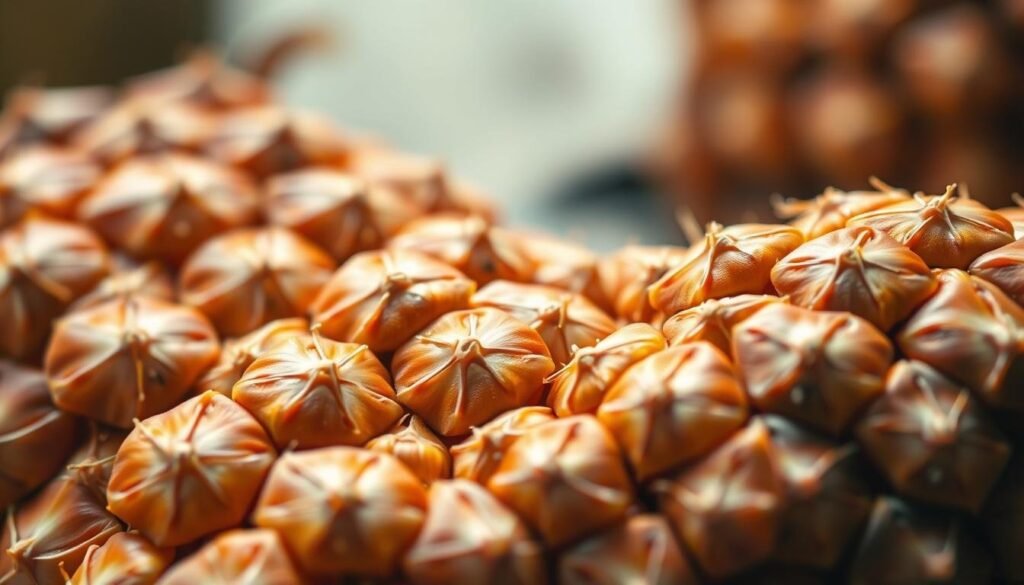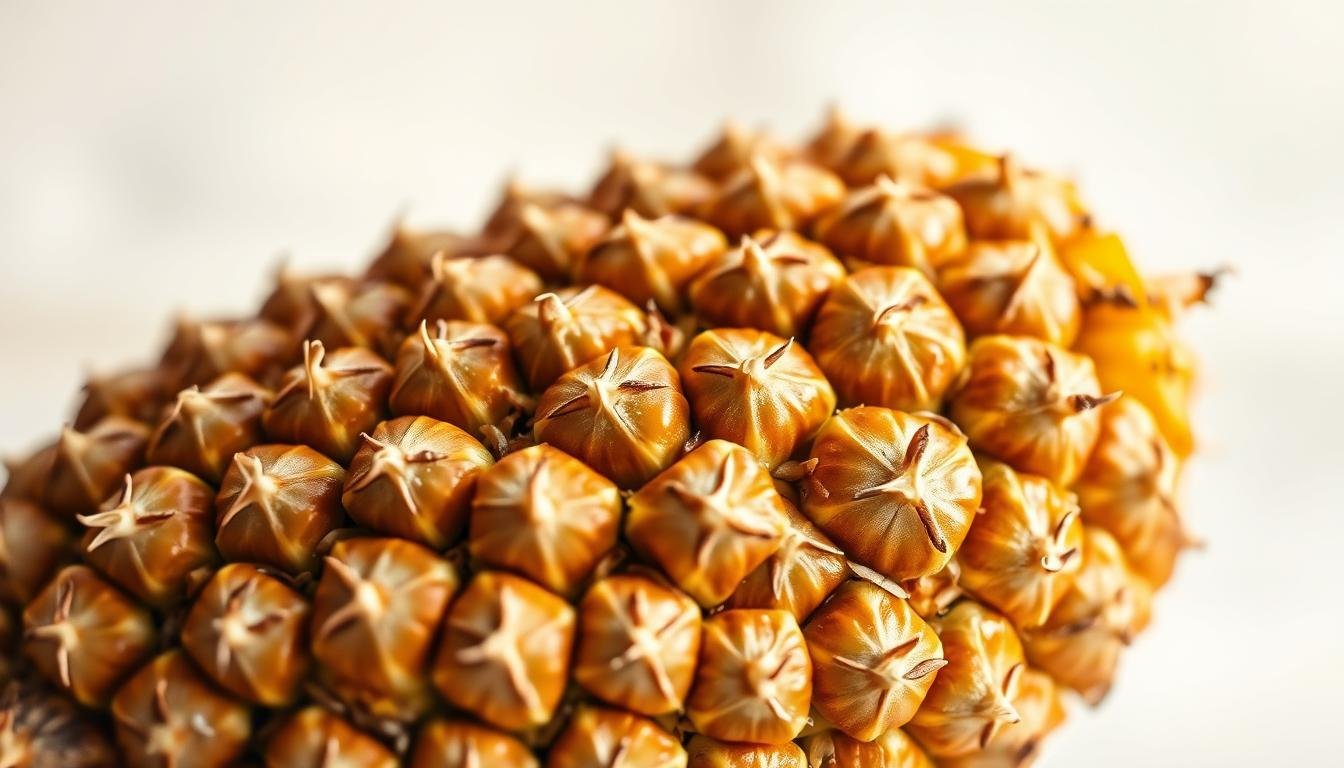Last updated on August 21st, 2025 at 02:44 pm
Can You Eat Pineapple Seeds? Pineapple is a tropical fruit loved by many for its sweetness and health perks. When enjoying a fresh pineapple, you might think about its seeds.
Pineapple seeds are often ignored but could be good for you. Learning if they’re safe to eat and their benefits can help you understand pineapples better.
This article will look into if you can eat pineapple seeds and what they offer nutritionally. It aims to answer your questions about adding them to your meals.
Contents
- 1 What Are Pineapple Seeds?
- 2 Can You Eat the Seeds of a Pineapple?
- 3 Nutritional Profile of Pineapple Seeds
- 4 Potential Health Benefits of Pineapple Seeds
- 5 Risks and Side Effects
- 6 How to Consume Pineapple Seeds
- 7 Cultural and Traditional Uses of Pineapple Seeds
- 8 Conclusion: Can You Eat Pineapple Seeds?
- 9 FAQ
- 9.1 Are pineapple seeds safe to eat?
- 9.2 What are the nutritional benefits of pineapple seeds?
- 9.3 Can I grow a pineapple from pineapple seeds?
- 9.4 How do I prepare pineapple seeds for consumption?
- 9.5 Are there any potential allergic reactions to consuming pineapple seeds?
- 9.6 Can pineapple seeds interact with any medications?
- 9.7 Are pineapple seeds used in traditional medicine?
- 9.8 Can I consume pineapple seeds raw?
What Are Pineapple Seeds?
Pineapples have seeds hidden inside their flesh. These seeds help grow new plants if the conditions are right. They are a key part of the pineapple’s life cycle.
Pineapples are sweet and juicy, loved by many. Their seeds are small and found in the core. Though not often eaten, they have unique qualities and uses.
A pineapple is made up of many flowers that grow together. Each scale is a flower, and the seeds are inside this tough, waxy layer. Knowing this helps us understand where the seeds are and their role in growing new plants.
Some people are curious about eating pineapple seeds. They are not common in many diets but have nutrients and health benefits. Looking into their nutritional value can show how they can add to our diet.
Can You Eat the Seeds of a Pineapple?
Many people wonder if pineapple seeds are safe to eat. The answer is yes, you can eat them. But, there are a few things to think about before you do.
Pineapple seeds are not usually eaten because they are hard and bitter. Yet, they are not harmful and can be eaten raw or dried.
In some cultures, people eat pineapple seeds for their health benefits. The seeds have nutrients, but less than the fruit itself.
| Nutrient | Pineapple Fruit | Pineapple Seeds |
|---|---|---|
| Protein | 0.5g | 1.2g |
| Fiber | 1.4g | 2.5g |
| Vitamin C | 47.8mg | 1.1mg |
Even though pineapple seeds have nutritional value, they can be bitter and hard to digest.
Nutritional Profile of Pineapple Seeds
Pineapple seeds are full of nutrients. They have vitamins, minerals, and compounds that are good for your health.
Vitamins and Minerals in Pineapple Seeds
Pineapple seeds are rich in important vitamins and minerals. They have vitamin C, vitamin B6, and manganese, among others.
| Nutrient | Amount per Serving | % Daily Value |
|---|---|---|
| Vitamin C | 10mg | 15% |
| Vitamin B6 | 0.2mg | 10% |
| Manganese | 0.5mg | 25% |
Pineapple seeds have a unique nutritional profile. They have a different mix of vitamins and minerals than chia seeds or flaxseeds. Adding pineapple seeds to your diet can give you a nutritional boost and make your meals more interesting.
Potential Health Benefits of Pineapple Seeds
Pineapple seeds are often thrown away, but they are packed with health benefits. You can add them to your meals to enjoy these advantages.
These seeds are full of antioxidants. Antioxidants help protect your body from harmful free radicals. Free radicals can cause oxidative stress, leading to diseases like cancer and heart disease. Eating pineapple seeds can increase your antioxidant levels.
Some of the key health benefits of pineapple seeds include:
- Anti-inflammatory effects: Pineapple seeds contain compounds that may help reduce inflammation.
- Immune system support: The seeds are rich in vitamins and minerals that can support immune function.
- Antioxidant properties: As mentioned, the antioxidant properties help protect against cell damage.

You can add pineapple seeds to your meals for a nutritious boost. They’re great in salads, smoothies, or as a snack.
In summary, pineapple seeds offer many health benefits. They can help reduce inflammation and protect against cell damage. Adding them to your diet can improve your overall health and well-being.
Risks and Side Effects
Pineapple seeds are good for you, but they can also have risks and side effects. It’s important to know about these to eat them safely.
One big worry is allergic reactions. Some people might be allergic to pineapple seeds. This can cause anything from mild discomfort to serious problems.
Allergic Reactions and Interactions
Allergic reactions to pineapple seeds can show up in different ways. You might get skin rashes, itching, swelling, stomach cramps, diarrhea, or trouble breathing. In the worst cases, it can lead to anaphylaxis, a very serious condition that needs quick medical help.
Pineapple seeds can also mess with some medicines. Their high fiber can change how your body absorbs certain drugs. This might make the drugs not work as well or increase side effects.
| Potential Side Effects | Description | Precautions |
|---|---|---|
| Allergic Reactions | Symptoms include skin rashes, itching, swelling, and respiratory issues | Monitor for signs of allergy; consult a healthcare professional if symptoms occur |
| Interactions with Medications | High fiber content may affect drug absorption | Consult a healthcare provider before consuming pineapple seeds if you are on medication |
| Gastrointestinal Issues | High fiber can cause stomach cramps, diarrhea | Gradually increase consumption to allow digestive system to adjust |
To avoid problems with pineapple seeds, start with a small amount. Watch how your body reacts. If you have any bad effects, stop eating them and talk to a doctor.
How to Consume Pineapple Seeds
You can easily add pineapple seeds to your diet with a few simple steps. They are packed with fiber and antioxidants. Start by roasting the seeds to enhance their flavor.
To roast pineapple seeds, preheat your oven to 350°F (175°C). Spread the seeds on a baking sheet. Roast for 10-15 minutes, or until they’re lightly browned. Watch them closely to avoid burning. Roasting makes them a tasty addition to salads or snacks.
Another way to enjoy pineapple seeds is by grinding them into flour. Use a spice or coffee grinder to do this. The flour can be used in baking, adding nutrition to your treats. You can replace some regular flour with pineapple seed flour in your recipes.
Using Pineapple Seeds in Recipes
Pineapple seeds can also be used directly in recipes. Sprinkle them on yogurt or oatmeal for a crunchy, nutritious topping. They’re also great in smoothies or salads for extra fiber and antioxidants.
| Preparation Method | Description | Nutritional Benefit |
|---|---|---|
| Roasting | Roast at 350°F (175°C) for 10-15 minutes | Enhances flavor, crunchy texture |
| Grinding into Flour | Use a spice or coffee grinder | Adds fiber and nutrients to baked goods |
| Direct Use | Sprinkle on yogurt, oatmeal, or add to smoothies | Boosts fiber and antioxidant intake |
By adding pineapple seeds to your diet, you can enjoy their health benefits. Plus, you’ll add variety to your meals.
Cultural and Traditional Uses of Pineapple Seeds
Pineapple seeds have a special place in many cultures. They are not just leftovers from eating pineapple. Instead, they carry deep cultural and traditional meanings.
In traditional medicine, people use pineapple seeds for their health benefits. They believe these seeds can fight inflammation and help with different health issues.
These seeds also play a role in cooking. In some places, they are dried and used as a spice. They add flavor and nutrition to local dishes.
Here is a table highlighting some of the cultural and traditional uses of pineapple seeds:
| Culture | Traditional Use |
|---|---|
| South American | Used in traditional medicine for anti-inflammatory purposes |
| Southeast Asian | Dried and used as a spice in local cuisine |
| African | Believed to have healing properties and used in rituals |
Pineapple seeds are important in many cultures. They are used in medicine, cooking, and rituals. People value them for their unique benefits and properties.
Conclusion: Can You Eat Pineapple Seeds?
Pineapple seeds are not only edible but also packed with nutrients. They are full of vitamins, minerals, and antioxidants. These can help make your diet healthier.
Eating pineapple seeds can offer several benefits. They might help reduce inflammation and improve digestion. This makes them a great addition to your meals.
To enjoy pineapple seeds, you can eat them raw or roasted. You can also add them to different recipes. But, be careful of any allergies or side effects. Knowing about pineapple seeds can help you decide if they’re right for you.
In short, pineapple seeds are a nutritious and tasty food. They can add flavor and health benefits to your diet. So, consider adding them to your next meal.
See Also: Eating Pumpkin Seeds: What You Need to Know
FAQ
Are pineapple seeds safe to eat?
Yes, pineapple seeds are safe to eat. But, eating them in small amounts is best. This is because they might upset your stomach in some people.
What are the nutritional benefits of pineapple seeds?
Pineapple seeds are packed with vitamins, minerals, and antioxidants. They have manganese, copper, and fiber. Adding them to your diet can be very nutritious.
Can I grow a pineapple from pineapple seeds?
Growing a pineapple from seeds is possible. But, it’s not very successful. The plant might not grow fruit that tastes like the original pineapple.
How do I prepare pineapple seeds for consumption?
You can roast or dry pineapple seeds to make them taste better. Or, you can grind them into flour. Use this flour in baking or as a thickener.
Are there any potential allergic reactions to consuming pineapple seeds?
Yes, some people might be allergic to pineapple seeds. This can cause hives, itching, or stomach problems. If you have a bad reaction, stop eating them and talk to a doctor.
Can pineapple seeds interact with any medications?
Pineapple seeds might affect certain medicines, like blood thinners. They have a compound called coumarin. If you’re on medication, talk to your doctor before eating pineapple seeds.
Are pineapple seeds used in traditional medicine?
Yes, pineapple seeds have been used in traditional medicine. They are believed to have anti-inflammatory and antimicrobial properties.
Can I consume pineapple seeds raw?
You can eat pineapple seeds raw, but they might taste bitter and be hard to chew. Roasting or drying them can make them taste and feel better.

Hello, I am Bellamy George, a certified nutritionist and food safety specialist from Springfield, IL. With a degree in Food Science, I share research-backed insights on edible foods, seeds, and seafood for safe, informed eating.

